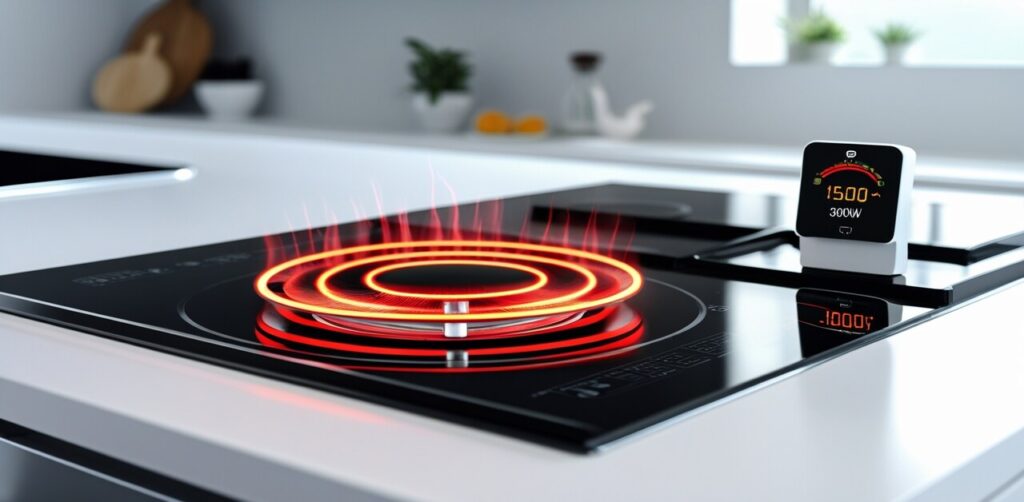Understanding the energy consumption of your electric stove is vital whether you’re a homeowner looking to manage your utility bills, a chef crafting culinary magic, or an eco-conscious enthusiast exploring energy-efficient cooking. For off-grid living or daily energy savings, knowing your electric stove’s wattage can make all the difference in choosing the right appliance and fine-tuning your cooking habits.
This blog takes an in-depth look at electric stove wattage—from average energy consumption to energy-efficient models, safety considerations, and how to choose the best stove for your kitchen. By the end, you’ll gain a clear understanding of how electric stoves operate and how they fit into energy-efficient and modern cooking needs.
How Many Watts Does an Electric Stove Use?
Electric stoves are commonplace in most modern kitchens, but few consider how much power these appliances consume. Let’s break it down.
Understanding Electric Stove Wattage
Electric stoves work by converting electrical energy into heat. The wattage of an electric stove indicates how much energy it draws while operating, and it plays a crucial role in determining energy consumption over time. The higher the wattage, the more electricity the appliance uses.
Stove burners typically range between 1,000 and 3,500 watts, depending on size and model. Larger burners require more energy to produce higher heat levels, while smaller ones are more energy-efficient for smaller meals or simmering.
Wattage by Stove Type
Not all electric stoves are created equal. Here’s an overview based on the type of stove:
- Coil Stovetops
Coil stovetops, traditional and sometimes considered less efficient, usually consume 1,200 to 2,400 watts per burner, depending on the size.
- Smooth-Top Stoves
These modern appliances provide sleek aesthetics and improved energy transfer. On average, these stoves consume 1,200 to 3,000 watts per burner.
- Induction Stoves
The most energy-efficient option, induction stoves use magnetic fields to generate heat directly in the cookware. They consume roughly 1,200 to 3,500 watts, depending on burner size—but they heat faster and use less energy overall.
Factors Affecting Electric Stove Wattage
It’s worth noting that the actual energy consumption of your electric stove depends on several factors:
- Cooking Time
Longer cooking sessions will increase total energy usage.
- Heat Setting
Higher heat settings directly lead to higher wattage usage.
- Cookware Material
The efficiency of heat transfer often varies based on the cookware’s material. Induction stoves, for example, require compatible cookware to minimize energy loss.
- Number of Burners Used
Using multiple burners simultaneously will take up significantly more energy.
Understanding these variables helps optimize your stove usage, potentially saving energy in the process.
Energy Efficiency and Off-Grid Cooking
For those focused on sustainability or minimizing energy costs, it’s crucial to understand how electric stoves compare to other cooking options.
Comparing Electric and Gas Stoves for Energy Savings
While gas stoves are celebrated for their instant heat and lower upfront costs, they may not always be the most energy-efficient option when compared directly to electric stoves.
- Electric Stoves:
Typically more efficient in converting energy to heat, electric stoves eliminate the residual energy waste common in gas stoves.
- Gas Stoves:
Though gas stoves have lower operating costs in certain regions, they involve energy loss during heat dispersion and can release carbon monoxide—a health and environmental concern.
For households prioritizing energy-efficient cooking with less environmental impact, induction stoves are the standout choice. They boast up to 85-90% efficiency in energy transfer, compared to just 50% for gas stoves.
Off-Grid Cooking with Electric Stoves
Off-grid living presents unique challenges. While gas stoves are often chosen for their independence from electrical power, electric stoves can still be viable for off-grid setups when paired with renewable energy sources like solar panels.
An energy-efficient induction stove combined with a robust solar panel system and battery storage ensures sustainable, safe off-grid cooking without sacrificing modern kitchen conveniences.
Safety Considerations
When choosing an electric stove, safety is an essential aspect that often gets overlooked. Here’s why electric stoves offer a safer cooking environment—and how to use them responsibly.
- No Carbon Monoxide Risks
Unlike gas stoves, electric stoves do not produce harmful carbon monoxide, making them a safer choice for households.
- Cool-to-Touch Induction Cooktops
Induction stoves are safer because their surfaces stay relatively cool while cooking.
Tips for Safe Electric Stove Usage
- Check Electrical Connections
Regularly inspect your stove’s power cord and outlet to ensure safe operation.
- Avoid Overloading Circuits
High-wattage appliances like electric stoves can strain circuits; consider installing a dedicated electrical circuit.
- Keep Burners Clean
Residue can affect heating efficiency and increase fire risks.
- Supervise Cooking
Never leave your stove unattended while in use.
Choosing the Right Electric Stove for Your Needs
The right electric stove can make or break your kitchen experience. Here’s how to find the one best suited for your lifestyle and cooking habits.
Factors to Consider
- Cooking Needs
More burners and higher wattage are ideal for larger households.
- Energy Efficiency
Look for ENERGY STAR-rated models to save electricity over time.
- Budget
Balancing upfront costs with long-term energy savings is key.
Energy-Efficient Stove Models Worth Exploring
Some brands stand out in energy-efficient cooking solutions:
- Bosch 800 Series Induction Stove: A premium option with excellent efficiency.
- GE Smooth-Top Electric Range: A budget-friendly yet reliable choice.
- Duxtop Portable Induction Cooktop: Ideal for off-grid enthusiasts or small kitchens.
Insights for Renovators
Kitchen renovators may benefit from sleek designs like smooth-top stoves, which combine modern aesthetics with performance. For off-grid setups, investing in induction-compatible solar solutions ensures seamless integration.
Takeaways for Energy-Efficient Cooking Enthusiasts
Electric stoves are a brilliant choice for modern, eco-conscious kitchens. Whether you’re managing your energy bills, renovating your kitchen, or cooking off-grid, understanding your stove’s wattage goes a long way in optimizing efficiency and ensuring safety.
To make sustainable cooking part of your routine, explore energy-efficient electric stoves and incorporate best safety practices. Plus, share the love for smart cooking solutions—tag someone exploring appliance upgrades or comment with your favorite electric stove tips!



